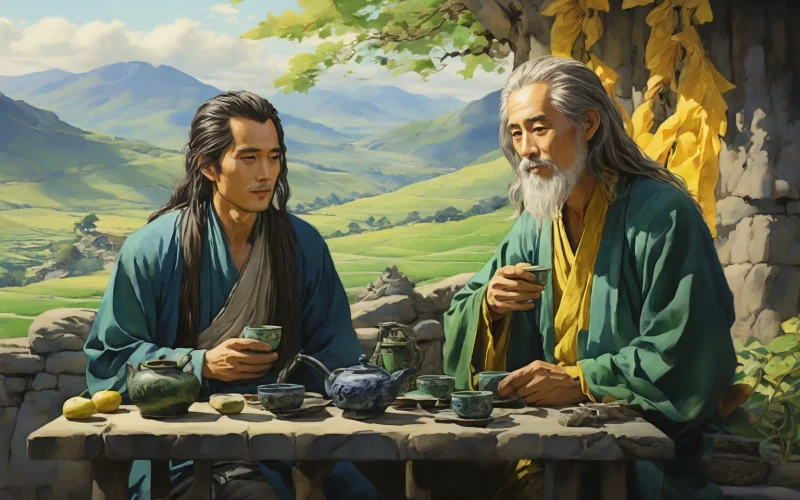In bygone days I traveled far and wide,
Nearly as far as the eastern seaside.
Can I forget my journey hard and long,
Impeded by heavy rain and wind strong?
For what should I have gone such a long way,
Were I not driven by hunger I'd stay?
I did my best to get my daily meal,
A little bit seemed to me a great deal.
Afraid no office work was worth my strife,
I would go back to live my rural life.
Original Poem
「饮酒 · 其十」
陶渊明
在昔曾远游,直至东海隅。
道路迥且长,风波阻中涂。
此行谁使然?似为饥所驱。
倾身营一饱,少许便有馀。
恐此非名计,息驾归闲居。
Interpretation
Composed around 416 AD during Tao Yuanming's reclusive years, this introspective poem belongs to his "Twenty Poems on Drinking" series. The work reflects on his earlier official career—driven by necessity rather than ambition—and crystallizes his hard-won conviction to embrace rural solitude. Through autobiographical recollection and philosophical revelation, it articulates his rejection of worldly striving and affirmation of simple, authentic living.
First Couplet: "在昔曾远游,直至东海隅。"
Zài xī céng yuǎnyóu, zhí zhì dōnghǎi yú.
In youth I journeyed far—clear to eastern ocean's rim.
The opening recollection establishes spatial magnitude ("eastern ocean") to emphasize past wanderings' exhaustive scope, suggesting both physical travel and metaphorical wandering through officialdom.
Second Couplet: "道路迥且长,风波阻中途。"
Dàolù jiǒng qiě cháng, fēngbō zǔ zhōngtú.
Roads stretched endless ahead; wind-waves stalled me mid-course.
"Wind-waves" (风波) operate dually: as nautical hazards during actual travel and as symbols of political turbulence that thwarted his bureaucratic career. The couplet's parallel structure ("endless roads"/"stalled mid-course") mirrors life's frustrated trajectories.
Third Couplet: "此行谁使然?似为饥所驱。"
Cǐ xíng shuí shǐ rán? Sì wèi jī suǒ qū.
What drove such wandering? Mere hunger's lash, it seems.
The self-interrogation reveals painful honesty—his official service stemmed from basic survival needs, not higher aspiration. The rhetorical question underscores life's ironic compulsions.
Fourth Couplet: "倾身营一饱,少许便有馀。"
Qīng shēn yíng yī bǎo, shǎoxǔ biàn yǒu yú.
Straining just for sustenance—so little would suffice!
Epiphanic in tone, this couplet exposes the disproportion between effort ("straining") and actual need ("so little"). The realization dismantles society's false equation of worth with material accumulation.
Fifth Couplet: "恐此非名计,息驾归闲居。"
Kǒng cǐ fēi míng jì, xī jià guī xiánjū.
Fearing this no noble path, I halted—home to quietude.
The conclusion's decisive verbs ("fearing"/"halted") mark his conscious rejection of compromised living. "Quietude" (闲居) emerges not as escape but as hard-earned ethical position.
Holistic Appreciation
Written in first-person narrative, this poem reflects on the poet's official career with profound introspection rather than mere storytelling. While the tone remains plain and unadorned, the underlying meaning runs deep. Tao candidly admits having pursued officialdom because "driven by hunger," revealing his helplessness under material constraints. After experiencing how "storms obstructed midway," he gained clearer realization: this was neither righteous path ("名计") nor road to honor, thus decisively "halting carriage to return to leisure" - embarking on his reclusive journey.
The latter section, though linguistically simple, demonstrates remarkable insight, expressing the poet's philosophy of "contented self-sufficiency." The lines "stooping for one meal's gain, a little satisfies" embody profound understanding of "contentment brings happiness," resonating with Daoist wisdom. Rather than outright rejecting worldly life, Tao made conscious choice after personal experience, showcasing his steadfast moral conviction and commitment to noble character.
Artistic Merits
The poem skillfully blends recollection with introspection, depicting both external journey's turbulence and internal motivations, carrying strong self-reflective quality. Its language remains naturally simple without rhetorical flourish, yet radiates rational brilliance throughout. Particularly outstanding are the paired phrases "driven by hunger" and "stooping for one meal's gain," which with utmost conciseness reveal human predicament and awakening before fame and fortune, demonstrating Tao's consistent clarity and lofty vision.
Insights
This poem enlightens us: life's true needs are often simple; yet excessive pursuit of fame and gain only leads to self-loss. True wisdom lies in recognizing vanity's emptiness and having courage to stop and return. Through personal experience, Tao Yuanming shows us better to till poor lanes and dwell in leisure than drift through life's storms. His choice not only guards personal integrity but shines as independent spirit's radiance, reminding us amidst worldly chaos to keep初心 (original aspirations) and preserve tranquility.
Poem translator
Xu Yuanchong (许渊冲)
About the poet

Tao Yuanming(陶渊明), 365 – 427 CE, was a poet, literary figure, fu writer, and essayist active during the late Eastern Jin and early Liu Song dynasties. Born in Chaisang (near present-day Jiujiang, Jiangxi Province), he pioneered a new genre of pastoral-themed literature, expressing profound philosophical insights through simple language. His poetic style became an enduring aesthetic standard in classical Chinese poetry.











